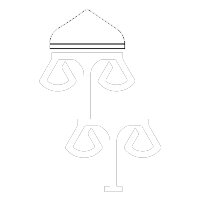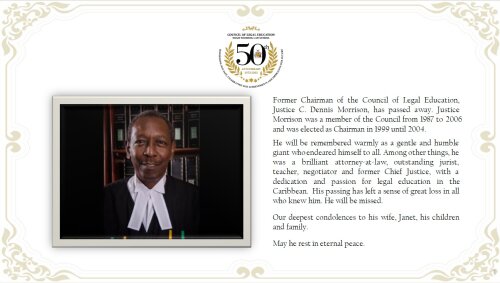Best Constitutional Law Lawyers in Trinidad and Tobago
Share your needs with us, get contacted by law firms.
Free. Takes 2 min.
Or refine your search by selecting a city:
List of the best lawyers in Trinidad and Tobago
About Constitutional Law in Trinidad and Tobago
Constitutional Law in Trinidad and Tobago centers around the Constitution, which is the supreme law of the land. It outlines the fundamental principles and established precedences according to which the nation is governed. Originally enacted in 1962 at the country's independence, and later revised with the 1976 Republication, the Constitution organizes government into three branches: the Executive, Legislature, and Judiciary. It also enshrines the fundamental rights and freedoms of individuals, thus functioning as a safeguard against abuse of power. Understanding these provisions is critical for maintaining democracy and the rule of law in Trinidad and Tobago.
Why You May Need a Lawyer
There are many scenarios in which individuals or entities might seek legal assistance regarding Constitutional Law. Some common situations include:
- Human Rights Violations: If you believe your fundamental rights have been infringed upon, such as rights pertaining to freedom of expression, equality before the law, or protection from discrimination, a Constitutional Law attorney can help seek remedies and justice.
- Judicial Review: When government actions or legislation are assumed to be unconstitutional, legal representation becomes necessary to challenge such measures in court.
- Public Interest Litigation: To advocate for broader societal issues that affect many people or the environment, legal expertise is crucial for navigating complex legal processes.
- Legislative Interpretation: Legal experts aid in interpreting and understanding constitutional language which can be complex and nuanced.
Local Laws Overview
Trinidad and Tobago’s Constitutional Law is shaped by a combination of historical contexts and statutory interpretations. Key aspects include:
- Fundamental Rights and Freedoms: As enshrined in Chapter 1 of the Constitution, these rights protect individuals against governmental abuse and ensure civil liberties.
- Separation of Powers: The framework divides power among the Executive, Legislature, and Judiciary to provide checks and balances.
- Supremacy of the Constitution: All laws and acts of government are subject to the Constitution, ensuring that any conflict is resolved in favor of constitutional mandates.
- Amendment Procedures: Any modifications to the Constitution require a challenging procedural threshold, signaling stability and enduring legal principles.
Frequently Asked Questions
What is the main purpose of the Constitution in Trinidad and Tobago?
The Constitution serves as the supreme law, providing the framework for governance and protecting the fundamental rights and freedoms of its citizens.
How are individual rights protected under the Constitution?
These rights are safeguarded primarily in Chapter 1 of the Constitution, ensuring protection through various provisions against infringements by the state.
Can laws passed by the Parliament be declared unconstitutional?
Yes, laws that are inconsistent with the Constitution can be challenged in the courts and potentially be declared unconstitutional.
How does the Constitution accommodate changes or amendments?
Amendments follow a rigorous process, usually requiring a special parliamentary majority and sometimes public referenda, to ensure broad consensus.
What role does the Judiciary play in Constitutional Law?
The Judiciary interprets and enforces Constitutional provisions, resolving disputes and protecting the legal rights of citizens.
What are judicial reviews and why are they important?
Judicial reviews evaluate whether government actions comply with the Constitution, serving as a crucial check on state authority.
How does the Separation of Powers doctrine operate?
This doctrine distributes government authority across three branches to prevent concentration of power and ensure accountability.
Can individuals file a constitutional motion without a lawyer?
While it is possible, it is generally advisable to seek legal advice due to the complexities in procedural and substantive law.
What are entrenched clauses, and why do they matter?
Entrenched clauses are parts of the Constitution requiring extraordinary procedures to amend, thus preserving core constitutional principles.
Is Trinidad and Tobago's Constitution influenced by international treaties?
International treaties may inform constitutional interpretation, but they do not automatically alter domestic constitutional law unless expressly incorporated.
Additional Resources
For further understanding and assistance, the following resources can be beneficial:
- Office of the Attorney General and Ministry of Legal Affairs
- Law Association of Trinidad and Tobago
- Legal Aid and Advisory Authority
- University of the West Indies (UWI) Faculty of Law
- Caribbean Court of Justice (CCJ) publications
Next Steps
If you require legal assistance in Constitutional Law, consider the following steps:
- Identify and document the specific constitutional issue or query you face.
- Consult with a qualified Constitutional Law attorney to understand your legal rights and options.
- Gather relevant documents and evidence that may support your case.
- Contact local legal aid services if financial constraints are an obstacle.
- Prepare for possible legal proceedings by comprehending the processes involved with your lawyer’s guidance.
Lawzana helps you find the best lawyers and law firms in Trinidad and Tobago through a curated and pre-screened list of qualified legal professionals. Our platform offers rankings and detailed profiles of attorneys and law firms, allowing you to compare based on practice areas, including Constitutional Law, experience, and client feedback.
Each profile includes a description of the firm's areas of practice, client reviews, team members and partners, year of establishment, spoken languages, office locations, contact information, social media presence, and any published articles or resources. Most firms on our platform speak English and are experienced in both local and international legal matters.
Get a quote from top-rated law firms in Trinidad and Tobago — quickly, securely, and without unnecessary hassle.
Disclaimer:
The information provided on this page is for general informational purposes only and does not constitute legal advice. While we strive to ensure the accuracy and relevance of the content, legal information may change over time, and interpretations of the law can vary. You should always consult with a qualified legal professional for advice specific to your situation.
We disclaim all liability for actions taken or not taken based on the content of this page. If you believe any information is incorrect or outdated, please contact us, and we will review and update it where appropriate.
Browse constitutional law law firms by city in Trinidad and Tobago
Refine your search by selecting a city.













